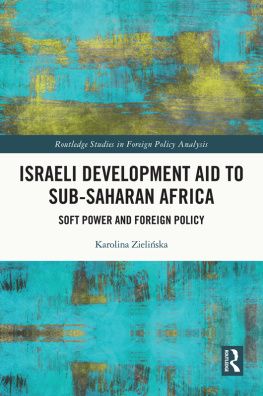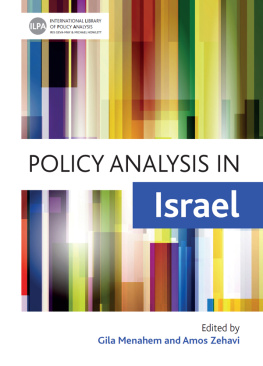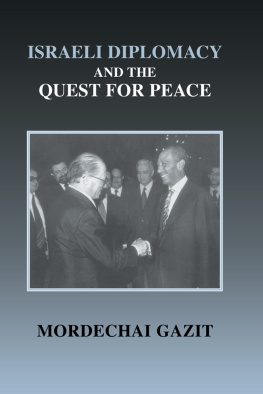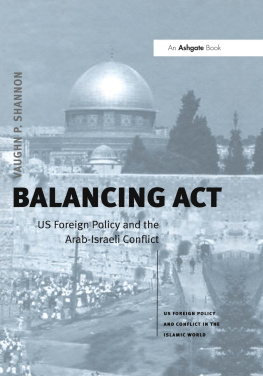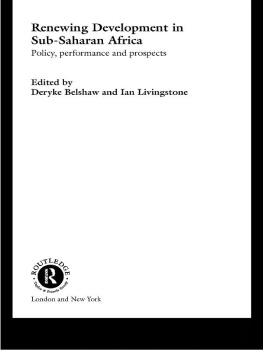Israeli Development Aid to Sub-Saharan Africa
This book deals with Israeli development aid to sub-Saharan Africa countries as a part of Israeli foreign policy.
The analysis is framed by the concept of soft power: an assumption that development cooperation increases attractiveness of the donor and contributes to constructive bilateral and multilateral relations. Israel is a particular case of a donor, as it concentrates on technical aid, and its aid is motivated by a distinct set of ideological and pragmatic motives.Covering the period since the 1950s till today, the book analyses specific Israeli resources relevant for African development and the system and contents of Israeli development aid, with a particular focus on a new phenomenon of the engagement of businesses and NGOs. Zieliska explores the geopolitical context of Israeli aid for sub-Saharan countries and the recipients perception of Israeli aid; asking if and how these attitudes influence the recipients behaviour towards Israel within their bilateral relations as well as on multilateral forums.
Contributing to the knowledge of development diplomacy as a form of expression of soft power and as a tool of foreign policy, it will be of interest to international relations students and faculty as well as to other people professionally dealing with Israeli foreign policies.
Karolina Zieliska is currently a research fellow in the Israel Research programme at the Centre for Eastern Studies in Warsaw, Poland.
Routledge Studies in Foreign Policy Analysis
Series Editors: Christopher Alden, London School of Economics, United Kingdom, and Amnon Aran, City University of London, United Kingdom https://www.routledge.com/series/RSIHR
The foreign policy analysis (FPA) series covers a broad intellectual canvass, which brings together scholars of international relations, area studies, politics and other related fields such as political psychology and administrative studies. It also engages with a wide range of empirical issues: from the study of the foreign policy of individual countries to specific aspects of foreign policy such as economic diplomacy or bureaucratic politics, through germane theoretical issues such as rationality and foreign policy. The series aims to specialize in FPA as well as appeal to the wider community of scholars within international relations, related fields and amongst practitioners. As such the range of topics covered by the series includes, but is not limited to, foreign policy decision-making; the foreign policy of individual states and non-state actors. In addition, it will include analytical aspects of foreign policy, for instance, the role of domestic factors; political parties; elites. Theoretical issueareas that advance the study of foreign policy analysis, for example, FPA and Gender, Critical FPA, FPA in a new media landscape, Ethics and FPA, are also be welcomed.
Intercultural Dialogue in EU Foreign Policy
The Case of the Mediterranean from the End of the Cold War to the Arab Uprisings
Pietro De Perini
Americas Allies and the Decline of US Hegemony
Edited by Jonathan Paquin and Justin Massie
Turkey, The EU, and The Middle East
Foreign Policy Cooperation and the Arab Uprisings
Bura Ssler
Foreign Policy Analysis of a Baltic State
Lithuania and Grybauskait Doctrine
Tomas Janelinas
Party Systems and Foreign Policy Change in Liberal Democracies
Cleavages, Ideas, Competition
Angelos Chryssogelos
First published 2021
by Routledge
2 Park Square, Milton Park, Abingdon, Oxon OX14 4RN
and by Routledge
52 Vanderbilt Avenue, New York, NY 10017
Routledge is an imprint of the Taylor & Francis Group, an informa business
2021 Karolina Zieliska
The right of Karolina Zieliska to be identified as author of this work has been asserted by her in accordance with Sections 77 and 78 of the Copyright, Designs and Patents Act 1988.
All rights reserved. No part of this book may be reprinted or reproduced or utilised in any form or by any electronic, mechanical, or other means, now known or hereafter invented, including photocopying and recording, or in any information storage or retrieval system, without permission in writing from the publishers.
Trademark notice: Product or corporate names may be trademarks or registered trademarks and are used only for identification and explanation without intent to infringe.
British Library Cataloguing-in-Publication Data
A catalogue record for this book is available from the British Library
Library of Congress Cataloging-in-Publication Data
Names: Zieliska, Karolina, author.
Title: Israeli development aid to sub-Saharan Africa : soft power and foreign policy / Karolina Zieliska.
Description: Abingdon, Oxon ; New York, NY : Routledge, 2021. |
Series: Foreign policy analysis | Includes bibliographical references and index.
Identifiers: LCCN 2020044767 (print) | LCCN 2020044768 (ebook) | ISBN 9780367633844 (hbk) | ISBN 9781003118961 (ebk)
Subjects: LCSH: Economic assistance, IsraeliAfrica, Sub-Saharan.
Classification: LCC HC800 .Z54 2021 (print) | LCC HC800 (ebook) | DDC 338.91/5694067dc23
LC record available at https://lccn.loc.gov/2020044767
LC ebook record available at https://lccn.loc.gov/2020044768
ISBN: 9780367633844 (hbk)
ISBN: 9780367633851 (pbk)
ISBN: 9781003118961 (ebk)
Typeset in Times New Roman
by KnowledgeWorks Global Ltd.
Contents
About the author
Abbreviations
1Theoretical basis and key definitions
2Foreign policy of the State of Israel
Subchapter 1: Evolving Israeli identity and security considerations
Subchapter 2: Sub-Saharan African countries in Israeli foreign policy
3Soft power of the state of Israel as a resource for development aid and public diplomacy
Subchapter 1: Development needs of Sub-Saharan Africa countries
Subchapter 2: Israeli soft power resources: Qualitative and swot analyses
4Israeli development aid
Subchapter 1: Israel as a Donor
Subchapter 2: Israeli development aid to Sub-Saharan African countries
5Israeli public diplomacy
Subchapter 1: Overview
Subchapter 2: Israels development diplomacy
6Geopolitical considerations affecting Israeli relations with sub-Saharan African countries
7International behaviours of sub-Saharan beneficiaries
Subchapter 1: Bilateral relations
Subchapter 2: Multilateral forums
Subchapter 3: People-to-people relations and public opinion
8Development aid to sub-Saharan African countries as an element of Israeli softpower
- About the author
- Abbreviations
- 1 Theoretical basis and key definitions
- 2 Foreign policy of the State of Israel
- Subchapter 1: Evolving Israeli identity and security considerations
- Subchapter 2: Sub-Saharan African countries in Israeli foreign policy
- 3 Soft power of the state of Israel as a resource for development aid and public diplomacy
- Subchapter 1: Development needs of Sub-Saharan Africa countries
- Subchapter 2: Israeli soft power resources: Qualitative and swot analyses

